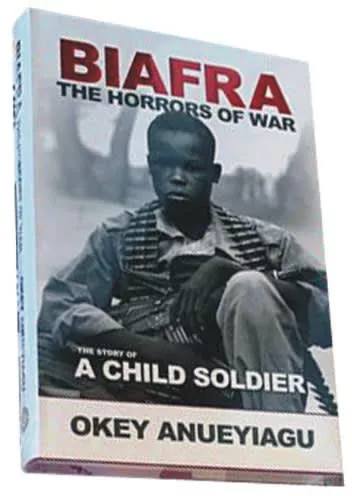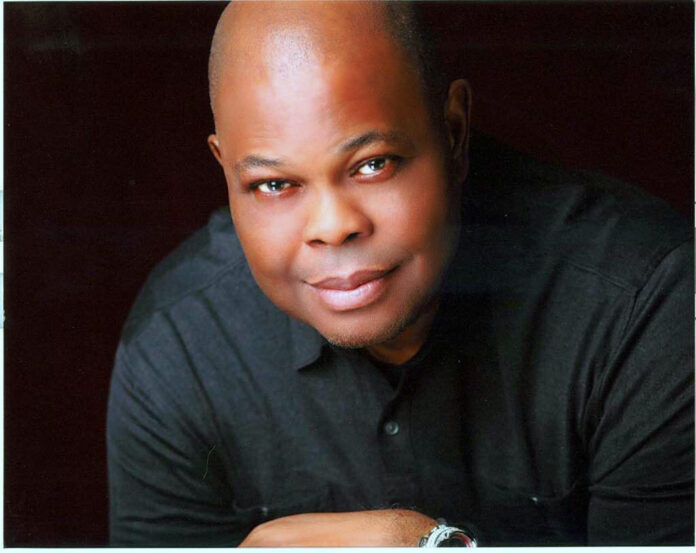The backlash of truth: I am particularly troubled by the insensitivity of the bulk of Nigerians who support the holocaust, the pogrom and the genocide against the lgbo in Biafra, and find a place in their hearts to stand up and condemn the State of Israel and their actions in Palestine. To not acknowledge and condemn the cycle upon cycle of the malevolent and repeated obliteration of the Igbo, is a horrible and hypocritical choice made by individuals and groups that sanctimoniously deploy these predictable deprecation and imprecation positions in their soiled and continuous hatred of the Igbo.

- The book
Right after the publication of my book; “Biafra, The Horrors of War, The Story of a Child Soldier,” I received an avalanche of reactions, most of them positive, and some,downright baleful and somewhat hostile. Intentionally, I have refrained frompromoting this book, principally because of the emotions and sensitivity associated tothe stories in the book, and in the history of the atrocities of the debacle of that war.
Regardless, this book threw up a wild storm, and certain paroxysm with such sentimental outburst that even surpassed the expectations of many.
My Book on the Biafra war became a thicket of thorns in the sides of those who committed the pogrom that claimed thousands of lives in the crisis of 1966, and also of the perpetrators of the genocide during the three year war. Even their children and grandchildren were, or have not been spared the piercing of these thorns and the disgraceful shame that accompanied their heinous crimes against humanity – in the killing of well over three million innocent Easterners. Despite the bolstering of irrefragable evidence of these misdeeds, my book seeks a reconciliatory posture from all sides.
It has become apparent that we now live in an era where no one is willing to listen to anything, but to the issues benefitting their own tribe, even as this book presents perfect and uncanny ways of opening up people’s eyes and ears to learn something new about life, and about the history of their country. Do we have hearts behind the cynicism about that war? Or, do we continue to rely on the evocation of the many archetypes of the happenings that destroyed our lives and our country? These are pertinent questions that require prospicient answers.
This book has become an inconvenient truth that hurts both the victor and the vanquished. It presents a haunting prevalence of pain, sorrow, and horrors that leaves one tasting the everlasting bitterness of the devastating mental and physical account of a people’s journey through perilous darkness in the period of a country gone berserk.
Even as I thought that I had left the bitterness of the biles of that war behind, I now taste it, with very vivid recollection, on my tongue and down to the bowels of my inner soul. As I take a moment to absorb the agonies of that period, I have now painfully realized that the reinforcement of my feelings come from no other place, but from the direction of those who have chosen to deny the truth about the war, and have conveniently altered the history of that period. The voices and actions of these people, carry a disturbing, sense of anguish and torment, and a remarkable amount of dishonesty and cruelty.
READ ALSO: My grandmother, her gods and I (Part III)
My grandmother, her gods and I (Part II)
My grandmother, her gods and I (1)
Today, as I consider myself some sort of a purveyor of truth, even within the narrow prism, as my limited knowledge allows me, I still see my effort as worthwhile, and as providing an intimate understanding of the invisible verisimilitude whenever I pull out my pen to write about our once vibrant and diverse, but now complicated societies. Every time I put my thinking cap on, and begin to write, it is like drawing a sharp and vicious sword to combat the injustice, inequities, unfairness and discrimination that have overtaken our world.
My story, is but a tiny fraction of stories and records of the war, pieced together and told boldly to the heart of Nigeria. But these stories reveal the degree to which decades and decades of evil that have been stacked against the people from the East, persevere, and that after 50 years of this crime without recrimination, atonement and punishment, the song remains the same. The corrosive effects of these longstanding debacles are still most apparent and remain a sore note in the history of our country.
In my writings about that rancid war, my attempt was not to assume a position of self-righteousness and detrimental judgment against any persons or groups, but, in my reservation of the harshest words for those who committed the atrocities of the war, seek peaceful reconciliation and restoration of our collective progression from the debris of our past.
I began to see a lot of resentment and some forms of pushback to the stories and history of the war. Some attacks rose from unsuspecting quarters, with the surviving victims of the war asking me to banish the ideas of telling the stories of the Biafra war. It did not matter to them if there are some truths in my stories, as they did not want to provoke the perpetrators of the war crimes in Biafra. The reasons for this malfeasance are as many as the idiocy behind them. The numerous occurrences of cases of this type stem, in my opinion, from self-hate, opportunism, fear, desperation, narcissism, or any other forms of disjointed human impulses.
In the same vein, many have also questioned my right to telling this story, accusing me of misrepresenting the facts and distorting the story to fantastical levels. Without offering alternatives to the known facts of the war and its atrocities, this band of critics embrace lies and deceit as concealments to what actually transpired in our checkered history. They have deployed vicious words against me and the book that sometimes recklessly pierce like poisoned swords in their failed attempt to discredit my book and label the authenticity of the stories as untrue, and existing only in the fantasy of the survivors of the war. A few of them went as far as saying that what we claim happened in Biafra with the starvation and death of millions of people, especially children and the elderly, lives only in the mind and imagination of the Igbo who they admonish and advice to seek psychiatric help for suffering from delusions of sort. This is just one element of the convenient lies that justify the telling of the story of the Biafra war, and telling it well.
In my book; Biafra, The Horrors of War, I was driven by the need to simply defy the lies of the “enemies” and their plan to stifle our story which began when they banned the study of History in our schools. This frightening distortion in our new age of rage and lunacy, prompted me to embrace the dictum that: history is not the past, that it is the present and that we must carry our history with us, because we are our history.
I believe that as our history is being distorted, rebranded and rewritten, it has become our sacred duty to make accountable metaphors of our history, by telling it exactly how it happened without being afraid. This is what I have set out to do, and I am eternally fulfilled that God has given me the courage and the lucidity to challenge our country’s past and present, and the injustices that many of its citizens have encountered, and continue to suffer.
The core value and essence of my book is the canvassing for a; “Truth, Reconciliation and Rehabilitation Commission” to be established with the most valid and transparent purpose. I believe that when this occurs, and Nigeria acknowledges that evil and wickedness have been elements of its character, and that the Igbo, and to an extent, other Easterners have for long been at the receiving end of these vile injustices, we would have discovered an easy and clear logic of redemption for all. In this case, the Nigerian people, especially those who think nothing of that devastating war, may have redeemed themselves through what I may attempt to call; an evolution of character, meaning that redemptive minds and hearts of such people may have evolved past their old impulses to evil and to things that are anathema to proper behaviour.
When we reconcile and rehabilitate, we may find through these types of moral evolution and rearmament, changes and transformations in our culture and collective psychology, by acknowledging and confessing in the truest sense and form our past mistakes. My trenchant thinking, is that this will restore our legitimacy as a people and deactivate the old evils by turning them into solemn and cautionary memories.
I am particularly troubled by the insensitivity of the bulk of Nigerians who support the holocaust, the pogrom and the genocide against the lgbo in Biafra, and find a place in their hearts to stand up and condemn the State of Israel and their actions in Palestine. To not acknowledge and condemn the cycle upon cycle of the malevolent and repeated obliteration of the Igbo, is a horrible and hypocritical choice made by individuals and groups that sanctimoniously deploy these predictable deprecation and imprecation positions in their soiled and continuous hatred of the Igbo.
Without any shadow of doubt, we must all strive to bring justice, equity, equality, fairness, peace and tranquility to our land, and show proper commitment to the ideals and to the goals and aspirations of the founding of our country. To do otherwise, is to fall prey to the primitive, primordially gutless and internecine idiocy of those who deliberately have chosen to turn our history upside down, driving the fractured nature of the fragility of our country toward a bitter and imperfect union.
AN EPILOGUE
In writing this essay; The Backlash of Truth, I had recalled with nostalgia, the second stanzas of the now recalled National Anthem to wit.
Our flag shall be a symbol
That Truth and Justice
reign, in Peace or Battle
honour’d,
And this we count as gain
To hand on to our
children
A banner without stain
This part of the Anthem lived in my head as I, in the company of many other children, waved that flag on the Independence Day in 1960.
(Please note that I drafted this essay before our Politicians contemplated reverting to the old National Anthem)
My goal as a child was to make Nigeria proud and make it a better place for all.
But it didn’t take long for my dear country to turn around and make my life a bitter mess by subjecting me and my people to a grim fate that took over three million innocent lives.
That flag that I joyfully waved, became shredded and stained with the blood of the innocent, and inflicted dire hardship, ache of hunger and despair, and death by stupefying and frightening the hell out of me.
Where thence is the symbol of that flag, and the inherent truth and justice that the Anthem promised us?
Where is the Peace and the flag without stain that was promised to our children?
It is clear to me that until we speak to Truth, we must hold our collective breath and reflect on our humanity and seek for contrition and compunction.
- Okey Anueyiagu, a Professor of Political Economy, is the author of: Biafra, The Horrors of War, The Story of a Child Soldier




